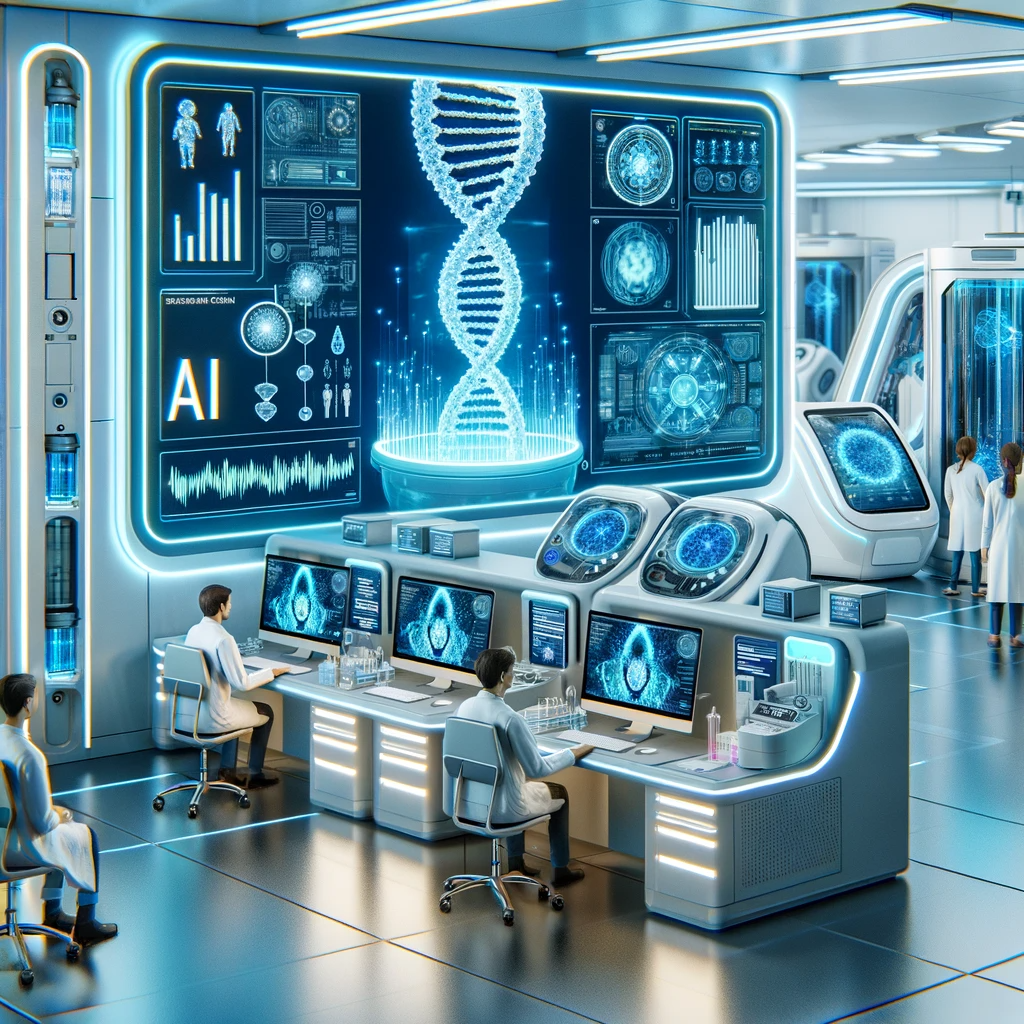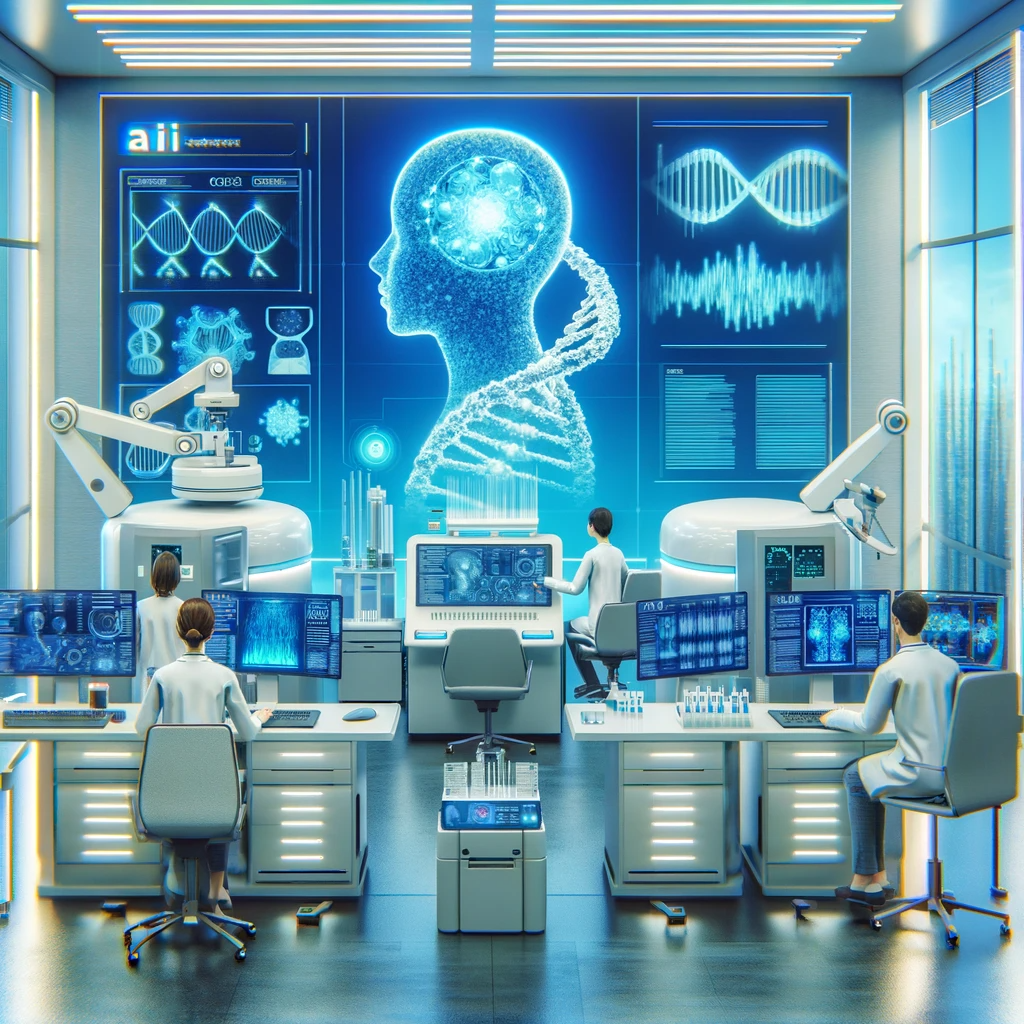In the realm of healthcare, the term “personalized medicine” has gained increasing prominence in recent years. It represents a revolutionary approach to medical treatment that tailors interventions to the unique characteristics of individual patients. At the heart of this transformation stands Artificial Intelligence (AI), a technological marvel with the potential to reshape the healthcare landscape. In this two-part article, we embark on a journey to explore AI’s impact on personalized medicine, delving into its applications, challenges, and the potential it holds for ushering in a new era of healthcare tailored to each patient’s needs.
Understanding Personalized Medicine
A Paradigm Shift in Healthcare
Personalized medicine marks a profound shift from the traditional one-size-fits-all approach to medical treatment. It recognizes that each patient is unique, and factors such as genetics, lifestyle, environment, and personal history influence their health and response to treatment. Instead of using broad treatment protocols, personalized medicine seeks to customize interventions to maximize efficacy while minimizing side effects.
Key Components of Personalized Medicine
- Genomic Information: One of the cornerstones of personalized medicine is the analysis of an individual’s genetic makeup. This information can reveal genetic predispositions to certain diseases, predict how a patient might respond to specific medications, and guide treatment choices.
- Biomarkers: Biomarkers are measurable indicators of a patient’s health or disease status. They can include anything from genetic markers to protein levels in the blood. Identifying relevant biomarkers enables more precise diagnoses and treatment plans.
- Data Integration: Personalized medicine relies on the integration of various data sources, including genetic data, clinical records, imaging, and lifestyle information. AI plays a pivotal role in processing and interpreting this diverse data.
The Role of AI in Personalized Medicine
AI-Powered Diagnostics
AI algorithms can analyze vast datasets to identify patterns and anomalies that might elude human interpretation. In the context of personalized medicine, AI aids in disease diagnosis by examining medical imaging, genetic data, and clinical records. For instance, AI can help radiologists detect tumors or abnormalities in medical scans more accurately and quickly.
Predictive Analytics
One of AI’s strengths lies in its predictive capabilities. By analyzing historical patient data and considering individual factors, AI can forecast disease risks, progression, and potential treatment outcomes. This predictive power guides clinicians in making informed decisions tailored to each patient.
Treatment Recommendations
AI-driven systems can analyze a patient’s genetic profile and medical history to recommend the most suitable treatments and medications. These recommendations consider genetic predispositions, potential drug interactions, and personalized efficacy. Such insights empower physicians to choose treatments that are more likely to succeed while minimizing adverse effects.
Drug Discovery and Development
AI accelerates drug discovery by analyzing vast datasets to identify potential compounds for disease treatment. This not only expedites the development of new medications but also allows for the customization of drug therapies based on an individual’s genetic makeup.
Challenges in Implementing AI-Powered Personalized Medicine
Data Privacy and Security
The collection and storage of sensitive medical data raise significant privacy and security concerns. Protecting patient information from breaches and unauthorized access is paramount in the era of personalized medicine.
Regulatory and Ethical Considerations
The integration of AI into healthcare requires robust regulatory frameworks to ensure patient safety and data ethics. Striking the right balance between innovation and patient protection remains a challenge.
Data Quality and Bias
The accuracy and quality of medical data are critical for AI-driven personalized medicine. Biased or incomplete datasets can lead to inaccurate predictions and recommendations, potentially compromising patient care.
Physician Training
Integrating AI into medical practice necessitates training healthcare professionals in AI usage. Ensuring that physicians are equipped to interpret AI-generated insights and collaborate effectively with AI systems is an ongoing challenge.
The Promise of a Healthier Future
AI’s role in personalized medicine is transformative, promising a future where medical treatments are precisely tailored to each patient’s unique characteristics. Part two of this article will delve deeper into AI’s applications in personalized medicine, its impact on patient care, and the challenges that must be addressed to realize its full potential. The era of personalized medicine is upon us, and AI is leading the way.
AI’s Impact on Patient Care
Improved Diagnosis and Early Detection
AI-powered diagnostic tools have demonstrated exceptional accuracy in detecting diseases and abnormalities in medical images, such as X-rays, MRIs, and CT scans. This has the potential to revolutionize early disease detection and improve patient outcomes. For example, AI algorithms can identify subtle signs of cancer or neurological disorders at a stage when interventions are most effective.
Precision Treatment Plans
Personalized medicine aims to deliver treatments tailored to individual patients. AI assists in creating precision treatment plans by considering a patient’s genetic profile, medical history, and specific disease characteristics. This approach not only enhances treatment efficacy but also reduces the risk of adverse reactions.
Drug Personalization
AI-driven pharmacogenomics allows physicians to customize drug therapies based on a patient’s genetic makeup. This means selecting medications with the highest likelihood of success while avoiding those that may cause adverse effects. Personalized drug regimens lead to better treatment outcomes and patient satisfaction.
Predictive Healthcare
AI’s predictive analytics can forecast disease risks and progression, enabling healthcare providers to intervene proactively. For instance, AI can predict an individual’s likelihood of developing diabetes based on genetic and lifestyle data. Physicians can then design preventive measures and lifestyle interventions to reduce the risk.
Enhancing Patient Engagement
Personalized medicine, powered by AI, empowers patients to actively participate in their healthcare decisions. Patients receive tailored information about their conditions and treatment options, fostering a sense of ownership and collaboration in their healthcare journey.
Addressing the Challenges
Data Sharing and Integration
One of the primary challenges in personalized medicine is the integration of diverse healthcare data sources. Ensuring interoperability among different systems and facilitating secure data sharing between healthcare providers are essential for seamless personalized care.
Ethical Considerations
As AI in personalized medicine continues to evolve, ethical considerations become increasingly significant. Balancing the benefits of AI with issues such as patient consent, data privacy, and equitable access to personalized treatments requires careful ethical deliberation.
Regulatory Frameworks
Regulatory bodies must adapt to the rapid advancements in AI and personalized medicine. Establishing clear guidelines for AI-driven medical applications ensures patient safety and fosters innovation without compromising quality standards.
AI Bias and Fairness
Guarding against algorithmic bias is paramount in AI-driven personalized medicine. Biased algorithms can lead to disparities in healthcare, affecting certain populations unfairly. Robust measures to identify and mitigate bias are essential.

The Future of Personalized Medicine and AI
AI’s role in personalized medicine is set to grow exponentially in the coming years. As AI algorithms become more sophisticated and data collection methods improve, the potential for personalized treatments and interventions will expand. Patients can expect more accurate diagnoses, targeted treatments, and a higher quality of care.
The healthcare industry will need to adapt to this evolving landscape by investing in AI education for healthcare professionals, strengthening data security measures, and establishing ethical guidelines for AI usage. Moreover, ongoing research and development efforts will continue to refine AI algorithms, making them even more reliable and capable of transforming patient care.
Conclusion
The integration of AI into personalized medicine represents a remarkable advancement in healthcare. It holds the promise of improved diagnosis, precision treatment plans, personalized drug regimens, and proactive healthcare interventions. However, it also poses challenges related to data integration, ethics, regulation, and bias mitigation.
In the end, the partnership between AI and personalized medicine is poised to usher in a new era of healthcare where patients receive treatments tailored to their unique characteristics and needs. With careful consideration of challenges and ongoing commitment to ethical and equitable practices, AI is set to lead the way towards a healthier, more personalized future in medicine.
